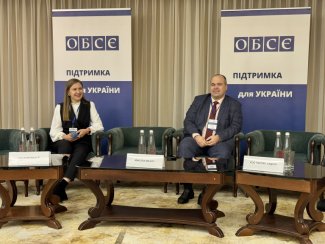Contact center of the Ukrainian Judiciary 044 207-35-46

Quite often, in various situations, there is a need to verify that the courts comply with the principle of non bis in idem (‘no one shall be punished twice for the same crime’). This issue causes difficulties not only in the work of Ukrainian courts, but also in the practice of the European Court of Human Rights, which has repeatedly clarified its position on this principle over the years. This was stated by Mykola Mazur, Judge of the Grand Chamber of the Supreme Court, during the International Scientific and Practical Conference ‘Europeanisation of Criminal Law of Ukraine’.
The principle of non bis in idem is enshrined in Article 4 of Protocol No. 7 to the Convention for the Protection of Human Rights and Fundamental Freedoms: ‘No one shall be subjected to retrial or punishment in criminal proceedings under the jurisdiction of the same State for an offence for which he has been finally acquitted or convicted in accordance with the law and criminal procedure of that State’.
As explained by the judge, the content of this conventional provision reflects the traditional approach, which limits the application of the non bis in idem principle to the criminal justice system. However, as a result of the autonomous interpretation of the term ‘criminal’ in the ECHR case law, the prohibition of repeated prosecution or punishment has also been extended to other types of proceedings and legal liability existing in different countries (administrative, disciplinary, financial, etc.). This has led to a somewhat inconsistent practice of the ECHR in situations where it is a question of bringing persons to several types of liability (e.g., administrative and criminal, etc.). The ECHR put a relative end to this issue only a few years ago.
Two cases are crucial for a correct understanding of the ECHR's position on the principle of non bis in idem.

Thus, in the case of Sergey Zolotukhin v. Russia, the Grand Chamber of the ECHR found that, firstly, to answer the question of whether the offences for which the applicant was prosecuted were the same (idem), it is not the legal qualification under domestic law but the relevant facts that are decisive, and secondly, Article 4 of Protocol No. 7 to the Convention extends not only to the right not to be punished twice, but also to the right not to be prosecuted or tried twice.
Considering the case of A and B v. Norway, the Grand Chamber of the ECHR clarified that the principle of non bis in idem will not be violated if two proceedings (e.g., administrative and criminal, tax and criminal, etc.) form a single whole and are not duplicated (for this purpose, they must be ‘sufficiently closely related in substance and time’).
Next, Mykola Mazur spoke about the case law of the Criminal Cassation Court of the Supreme Court on the application of the non bis in idem principle.
For example, in cases No. 493/1096/15-к (resolution of the panel of judges of the Criminal Cassation Court of the Supreme Court of 2 October 2018) and No. 686/11795/17 (resolution of the panel of judges of the Criminal Cassation Court of the Supreme Court of 8 December 2022), which concerned a situation where a person was convicted under part 1 of Article 286 of the Criminal Code of Ukraine after consideration of a protocol on an administrative offence under Article 124 of the Code of Ukraine on Administrative Offences, the SC concluded that there was no violation of the non bis in idem principle, as Article 124 of the Code of Ukraine on Administrative Offences, unlike Article 286(1) of the Criminal Code of Ukraine, does not provide for liability for causing moderate bodily harm in a road accident.
In case No. 663/3390/19 (resolution of the CrimCC of the Supreme Court of 12 October 2021), the panel of judges found the conclusions of the lower courts regarding the acquittal of a person under Article 126-1 of the Criminal Code of Ukraine (domestic violence) to be correct, since this charge was based only on facts for which the person had already been brought to administrative responsibility under Article 173-2 of the Code of Ukraine on Administrative Offences (committing domestic violence). Instead, in its ruling of 14 June 2022 in case No. 585/3184/20, the panel of judges of the CrimCC of the Supreme Court noted that the fact that a person has previously been brought to administrative responsibility for committing domestic violence does not indicate double legal responsibility of the same type for the same offence, but confirms the systematic nature of the perpetrator's actions, provided that the unlawful acts are repeatedly committed against a certain victim or persons and the occurrence of certain consequences defined by the legislator as more severe than those specified in the legislation of Ukraine on administrative offences.
The judge also spoke about some other cases concerning this principle and concluded that similar issues will likely arise again in the practice of both the Supreme Court and the ECHR.
The conference was organised by Yaroslav Mudryi National Law University.
Photos courtesy of the organisers.